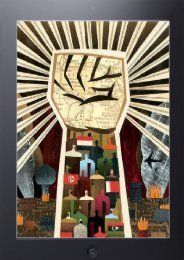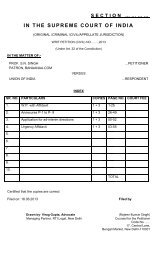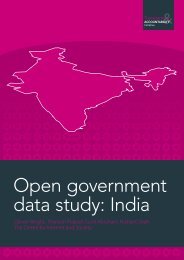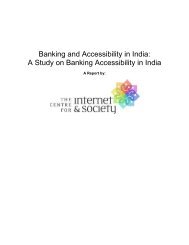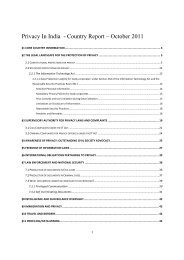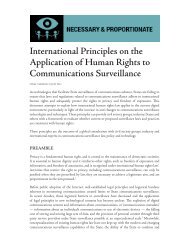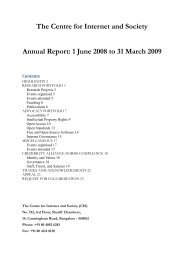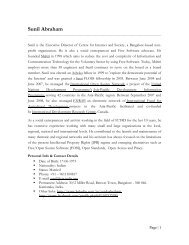Open Access to Scholarly Literature in India - Centre for Internet and ...
Open Access to Scholarly Literature in India - Centre for Internet and ...
Open Access to Scholarly Literature in India - Centre for Internet and ...
Create successful ePaper yourself
Turn your PDF publications into a flip-book with our unique Google optimized e-Paper software.
grossly uneven <strong>and</strong> this practice of pay<strong>in</strong>g <strong>for</strong> publication “will underm<strong>in</strong>e, rather than<br />
encourage, the whole area of grant free research.” 126<br />
To Lawrence Liang of the Alternative Law Forum publicly-funded <strong>in</strong><strong>for</strong>mation is part<br />
of the knowledge commons <strong>and</strong> it needs <strong>to</strong> be protected from commercial barriers. He<br />
would like us “<strong>to</strong> resist a property discourse that conflates property rights with academic<br />
rights <strong>and</strong> turns the collegiality of academe <strong>in</strong><strong>to</strong> the hierarchy of property. No one could<br />
‘own’ knowledge <strong>and</strong> that the greatest scientists are often called ‘gifted’, imply<strong>in</strong>g that<br />
their contribution was given <strong>to</strong> the world openly. The concept of sell<strong>in</strong>g such knowledge<br />
was alien <strong>to</strong> the academic world.” Property <strong>in</strong> the English sense, he says, the conflation of<br />
‘self’ <strong>and</strong> ‘own’ rest<strong>in</strong>g on exclusion, is someth<strong>in</strong>g not common <strong>to</strong> other languages. In<br />
H<strong>in</strong>di, ‘apnapen’ is not a matter of own<strong>in</strong>g, or property, but of closeness. Ownership <strong>in</strong><br />
this sense has the obligation of care. 127<br />
Prof. T V Ramakrishnan, a <strong>for</strong>mer President of the <strong>India</strong>n Academy of Sciences <strong>and</strong> a<br />
Fellow of the Royal Society, is a great supporter of open access <strong>to</strong>o: “I believe that open<br />
access <strong>to</strong> all publicly funded research is a moral obligation, <strong>in</strong> the follow<strong>in</strong>g sense. The<br />
greatest strength of science is that it is cooperative <strong>and</strong> 'open'. This is the ma<strong>in</strong> way I can<br />
underst<strong>and</strong> the size <strong>and</strong> strength of the flood of knowledge represented by science. Given<br />
this, it is natural <strong>and</strong> a matter of self sustenance <strong>to</strong> have open access <strong>to</strong> its results.”<br />
[Private communication]<br />
When asked why open access was not pick<strong>in</strong>g up <strong>in</strong> <strong>India</strong>, a senior scientist <strong>to</strong>ld “I do<br />
not th<strong>in</strong>k that the science managers of <strong>India</strong> by <strong>and</strong> large th<strong>in</strong>k this is an important question.<br />
They are concerned about other issues, <strong>and</strong> generally <strong>in</strong> the spirit of 'prabhavah<br />
samayadushita' (chang<strong>in</strong>g colours with chang<strong>in</strong>g times), <strong>in</strong> the language of Bhartrihari,<br />
the great poet <strong>and</strong> author of the Nitishataka (among other th<strong>in</strong>gs). He says that the<br />
lords, the ones with power, have lost the capacity of surprise or be<strong>in</strong>g surprised, or the<br />
impurity of self satisfaction is with<strong>in</strong> them.” [Private communication]<br />
126<br />
Gadagkar R (2008), <strong>Open</strong>-access more Harm than Good <strong>in</strong> Develop<strong>in</strong>g World, Nature, 453: 450;<br />
doi:10.1038/453450c.<br />
127 Supra note 90.<br />
Page | 60



